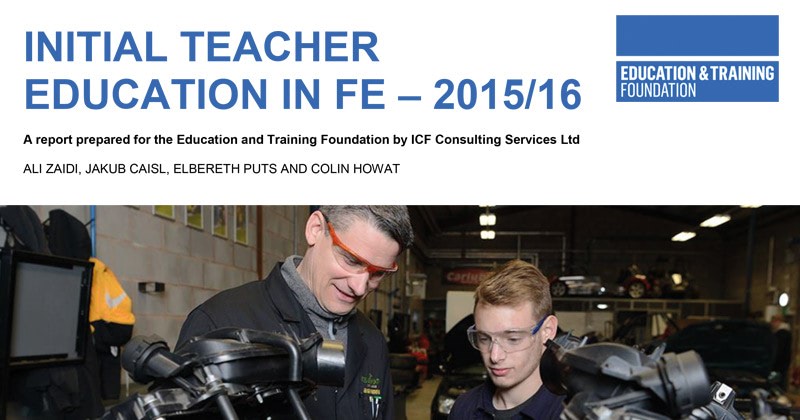ETF report shows quality of initial teacher training for FE profession is high

On 13th April the Education and Training Foundation (ETF) published the fourth annual report examining the provision and take-up of Initial Teacher Education (ITE) in the Further Education (FE) and Training sector. It is part of the ETF’s Spring series of independent, impartial and comprehensive research which started with the SIR Workforce Data Report, and will be followed by the Training Needs Analysis later this month.
The ITE report presents information on trainee teachers who attended ITE courses in the 2015/16 academic year, and the destinations of those on HE courses in 2016/17. The study also includes provider and qualification data from 2017/18.
The purpose of the research is to provide intelligence that can support policy makers and the sector in making informed decisions and ensuring a sufficient supply of high-quality teachers and trainers are entering FE – particularly relevant in the current policy climate. The technical education reforms outlined in the post-16 Skills Plan (2016) including T Levels are likely to have a transformative impact on the sector, changing both the programmes taught in FE and how they are delivered. Implementing them effectively will require a highly-skilled and adaptive FE workforce.
The study was commissioned by the Education and Training Foundation and undertaken by ICF Consulting Services Ltd. It draws on analysis of Higher Education (HE) and FE datasets on ITE qualifications, data from Ofqual, Ofsted and Awarding Organisations, and qualitative interviews with a selection of ITE providers.
Key findings of the report include:
- The delivery landscape is very diverse with 46 Awarding Organisations (AO) and 34 Higher Education Institutions (HEI) accredited ITE qualifications in 2015/16. FE colleges represent 45% of all ITE providers and 75% of Diploma or PGCE/Certificate of Education providers. Nearly 200 independent training providers and 110 Adult Community Learning providers deliver ITE, although most only deliver awards (Level 3).
- The quality of ITE provision is good. All HEIs and FE colleges that had their education and teaching programmes inspected achieved a good (Grade 2) or outstanding (Grade 1) inspection grade.
- There was a fall in the numbers studying for Awards (Level 3), Diplomas (Level 5) and PGCEs/Certificates of Education (Level 6/7) but an increase in those studying for Certificates (Level 4).
- For those studying at Level 5 and above (Diploma or PGCE/Cert Ed), the in-service option is falling in popularity.
- The overall number of ITE learners undertaking the specialist diplomas in literacy, numeracy and supporting learners with SEND has increased steadily from 20 to 254 between 2012/13 and 2015/16.
- Around 60% of ITE learners progressed to a teaching role in FE, of which 73% gained employment in FE colleges. An increasingly high proportion gained employment in independent training providers.
- The average salaries of ITE learners entering a full-time teaching role in 2015/16 was £25,220. This has remained relatively static since 2012/13.
 Charlynne Pullen, Head of Data and Evaluation at the Education and Training Foundation, said:
Charlynne Pullen, Head of Data and Evaluation at the Education and Training Foundation, said:
“This ITE report is a key part of the ETF’s Spring series of impartial and independent research, ensuring that practitioners, providers and policy makers have access to high-quality and reliable data to support their decision-making. The series will continue with the Training Needs Analysis which focuses specifically on trends in Continued Professional Development (CPD).
“Given the need to continue on the journey of driving up teaching and training standards in the sector, the fact that the quality of the organisations bringing future generations into the profession is high is a clear positive for the sector. The coming introduction of T Levels means we need a high-quality workforce to make sure they are a success. The gradually falling numbers joining the profession continues to be a challenge, but providing this data allows the whole sector to clearly identify and address both current and future trends or changes.”
About the Education and Training Foundation: The ETF is the government-backed, sector-owned national workforce and professional development body for the Further Education (FE) and Training sector. Its role is to support the continuing transformation of the technical and vocational education system by ensuring the sector has world-class leaders, teachers and trainers. This leads to ever-improving learner outcomes, a better skilled workforce for employers and a stronger economy, country and society. We do this by improving, driving and championing the quality of leadership, teaching and training through four key pillars:
- Setting professional standards, running the sector’s professional membership body (Society for Education and Training) and for awarding practitioners with QTLS and ATS
- Supporting sector change
- Leading workforce development for leaders, governors and practitioners
- Providing key workforce data and research.











Responses